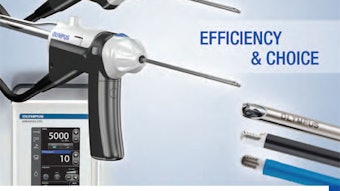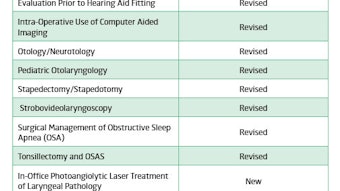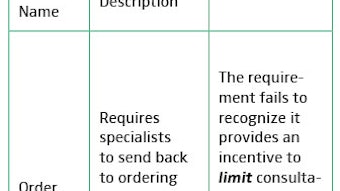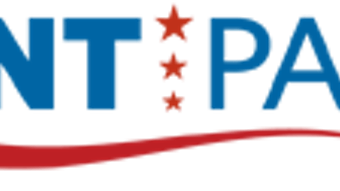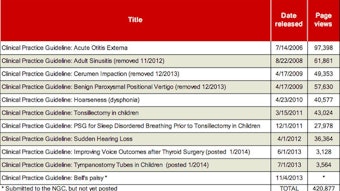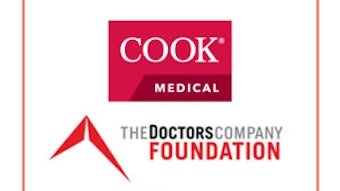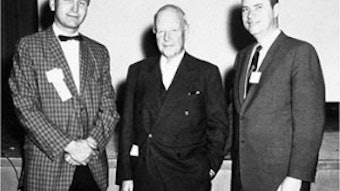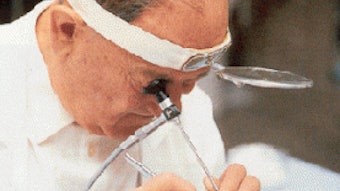Outcomes Research and Evidence Medicine Committee: A ‘Systematic Review’ – ONLINE EXCLUSIVE
Scott E. Brietzke, MD, MPH As my tenure on the Outcomes Research and Evidence Based Medicine (OREBM) committee soon comes to a close, I would like to take this opportunity to reflect and perform a “systematic review” of the many activities of the committee during the past several years. It has been an extraordinary privilege to serve on a committee with such talented and vibrant people who have selflessly donated their time and energy for the betterment of their fellow otolaryngologists and most importantly, for the betterment of our patients. As consistent with its formal charge, the committee has focused on activities to improve the overall evidence basis of our specialty as a whole. This has included primary research projects to address evidence gaps, meta-analyses, and other efforts to assist others in their research endeavors and their pursuit of an evidence-based practice. The results of the “systematic review” of the committee’s many recent activities are below. Studying Life Effects and Effectiveness of Palatopharyngoplasty (SLEEP) Principal investigator: Edward M. Weaver, MD, MPH SLEEP was a multisite, community-based study to demonstrate the quality of life (QoL) treatment effects of uvulopalatopharyngoplasty (UPPP). Up to the time of the study, sleep surgery procedures had only been measured in terms of polysomnography changes. Using a novel community-based research network approach, the study demonstrated that UPPP provides substantial and durable quality of life (QoL) improvements. Weaver EM, Woodson BT, Yueh B, Smith T, Stewart MG, Hannley M, Schulz K, Patel MM, Witsell D; the SLEEP Study Investigators. Otolaryngol Head Neck Surg. 2011 Apr;144(4):623-631. Epub 2011 Feb 10. Treatment of Advanced Laryngeal Cancer (TALC) Principal Investigator: Bevan Yueh, MD, MPH TALC is a prospective, multi-site study assessing how chemoradiation for patients with new tumors of the hypopharynx (T2, T3) and cartilage-invading larynx (T3, T4) impacts QoL, in particular, swallowing and speech. The immediate goals are to identify pre-treatment predictors of swallowing function after treatment, and to explore the relative impact of chemoradiation vs. laryngectomy on swallowing, with secondary analyses of outcomes such as self-reported health status, H&N-specific function, and speech. Enrollment closed December 31, 2013, and one year follow-up will be completed on December 31, 2014. Parental Response to Ear Disease In Children with and without Tubes (PREDICT) Principal Investigator: Judith E.C. Lieu, MD PREDICT is a multi-institutional study that explores the impact that ear disease has on the child and their family in terms of QoL. This study uses several QoL instruments, both disease-specific and general, and meets the Academy’s NIH PROMIS (Patient Reported Outcomes Measurement Information System) collaboration goals. The study showed that otitis media significantly decreases QoL and that ear tube placement was associated with significant increases in QoL. Grindler DJ, Blank SJ, Schulz KA, Witsell DL, Lieu JE. Impact of Otitis Media Severity on Children’s Quality of Life. Otolaryngol Head Neck Surg. 2014 Mar 13. Hoarseness Database Study Principal Investigator: Seth M. Cohen, MD, MPH The purpose of this study effort was to use a large national administrative claims database to evaluate the epidemiology, patient demographics, practice patterns, and outcomes of the treatment of dysphonia patients. These data proved to be very instructive and several associated studies were performed. Cohen SM, Kim J, Roy N, Asche C, Courey M. Prevalence and Causes of Dysphonia in a Large-Treatment Seeking Population. Laryngoscope. 2012;122:343-348. Cohen SM, Kim J, Roy N, Asche C, Courey M. The impact of laryngeal disorders on work-related dysfunction. Laryngoscope. 2012;122:1589–1594. Cohen SM, Kim J, Roy N, Asche C, Courey M. Direct health care costs of laryngeal diseases and disorders. Laryngoscope. 2012;122:1582–1588. Hypopharyngeal Obstructive Sleep Apnea (OSA) Surgery Survey Principal Investigator: Eric J. Kezirian, MD, MPH The purpose of this survey was to evaluate factors influencing evaluation of and treatment decisions for patients with obstructive sleep apnea (OSA). Multilevel sleep surgery including hypopharyngeal procedures has been shown to increase procedure success, yet few otolaryngologists perform hypopharyngeal procedures. This survey study sought to assess otolaryngologists’ perceptions and attitudes toward hypopharyngeal surgery. It showed that a lack of training and comfort with these procedures was the most common reason that hypopharyngeal surgeries were not more frequently utilized. Kezirian EJ, Hussey HM, Brietzke SE, Cohen SM, Davis GE, Shin JJ, Weinberger DG, Cabana MD. Hypopharyngeal surgery in obstructive sleep apnea: practice patterns, perceptions, and attitudes. Otolaryngol Head Neck Surg. 2012 Nov;147(5):964-71. Meta-Analysis of Macrolide Therapy for Chronic Rhinosinusitis Co-Investigtors: Melissa A. Pynnonen, MD, Greg E. Davis, MD, MPH, and Giri Venkatraman, MD, MBA The objective of this systematic review was to investigate the disease-specific QoL impact of long-term macrolide therapy, compared with any other treatment, for adults with chronic rhinosinusitis. It showed there is limited scientific evidence to support the use of long-term macrolide therapy for chronic rhinosinusitis. Pynnonen MA, Venkatraman G, Davis GE. Macrolide therapy for chronic rhinosinusitis: a meta-analysis. Otolaryngol Head Neck Surg. 2013 Mar;148(3):366-73. Systematic review of the use of specific neuromodulators in the treatment of chronic, idiopathic cough Co-Investigators: Seth M. Cohen, MD, MPH, and Stephanie Misono, MD, MPH The objective of this systematic review was to determine the role of specific neuromodulators (elavil, lyrica, neurotonin) in the treatment of chronic cough. It showed that the available evidence indicate that these medications indeed do provide measurable benefit for chronic cough patients. Cohen SM, Misono S. Use of specific neuromodulators in the treatment of chronic, idiopathic cough: a systematic review. Otolaryngol Head Neck Surg. 2013 Mar;148(3):374-82. Quality of Life Outcomes Tool Registry Scott E. Brietzke, MD, MPH This project was undertaken through the OREBM Committee to explore and compile the best available QoL instruments available for use in otolaryngology and to make them easily available on the Academy website as a resource to all members. The instruments are grouped by clinical focus and the pertinent details such as length and links to supporting validation publications are also included. http://www.entnet.org/EducationAndResearch/outcomesTools.cfm Otolaryngology Research Database Registry Jennifer J. Shin, MD, SM, and Melissa A. Pynnonen, MD This resource provides a compilation and description of existing datasets that may be appropriate for otolaryngology research. Each dataset is unique, with its own advantages, disadvantages, and nuances. To help newcomers identify a dataset that may be relevant for a particular research question, a basic overview of each dataset, example publications, and links for obtaining further information is provided. Datasets for inclusion were selected based on recommendations from members of the OREBM Committee. http://www.entnet.org/EducationAndResearch/Research-Databases.cfm Redesign of the Maureen Hannley Research Grant John S. Rhee, MD, MPH, and Scott E. Brietzke, MD, MPH The committee worked extensively with the research activities board and the CORE grant group to restructure the Maureen Hannley CORE Grant to support (maximum award of $50,000) primary research by young investigators that targets specific evidence gaps within the specialty of otolaryngology. http://www.entnet.org/EducationAndResearch/upload/2014-AAOHNSF-Maureen-Hannley-Grant_FINAL.pdf Annual Meeting Miniseminars The OREBM committee has also been strongly committed to educational efforts to increase knowledge and awareness of the principles and benefits of an evidence-based practice. The committee has sponsored several educational miniseminars at the annual meeting during the past few years in a variety of subject areas: Pediatric OSAS: Guidelines, Evidence, and Nuance (Vancouver 2013) Sleep Surgery Treatment Outcomes & Policy (Washington, DC, 2012) Rapid Review: The Guidelines in Pediatric Otolaryngology (Washington, DC, 2012) Evidence-Based Approach to Treating Chronic Rhinosinusitis (San Francisco 2011) Landmark Randomized Clinical Trials in Otolaryngology (San Francisco 2011) Outcomes Research: Past, Present, and Future (San Francisco 2011) Sleep Surgery: Reviewing the Reviews (San Francisco 2011) Cochrane and Guidelines International Network Scholars Participation as a Cochrane scholar and/or a Guideline International Network (G-I-N) scholar provides a phenomenal educational experience either in the area of meta-analysis and systematic review or in guideline development. Selectees attend an international meeting, network with leaders in the field, and then develop their new skill set within otolaryngology by completing either a meta-analysis project or participating in a guideline development panel. Below are members of the OREBM committee who were selected as Cochrane and/or G-I-N scholars. All interested Academy members should strongly consider pursuing this opportunity! Jennifer J. Shin, MD, SM (Cochrane 2008, G-I-N 2013) Seth M. Cohen, MD, MPH (Cochrane 2011) Melissa A. Pynnonen, MD (Cochrane 2011, G-I-N 2012) Lisa E. Ishii, MD, MHS (Cochrane 2012, G-I-N 2012) Stephanie Misono, MD, MPH (Cochrane 2012) Scott E. Brietzke, MD, MPH (G-I-N 2013) As I conclude this “systematic review” of the OREBM committee’s recent efforts, I would like to acknowledge the marvelous support from the Academy that has made this body of work possible. Although the faces and names of those who have supported the committee throughout the years have changed, the answer was always “yes!” for any effort the committee wanted to undertake and the support the committee received was always tireless and outstanding! As Dr. Jennifer Shin takes over leadership of the OREBM committee, I have no doubt that the long-standing traditions of the OREBM committee that include productivity and service with a clear goal of improving our specialty and the care of our patients will certainly continue.
Scott E. Brietzke, MD, MPH
As my tenure on the Outcomes Research and Evidence Based Medicine (OREBM) committee soon comes to a close, I would like to take this opportunity to reflect and perform a “systematic review” of the many activities of the committee during the past several years. It has been an extraordinary privilege to serve on a committee with such talented and vibrant people who have selflessly donated their time and energy for the betterment of their fellow otolaryngologists and most importantly, for the betterment of our patients. As consistent with its formal charge, the committee has focused on activities to improve the overall evidence basis of our specialty as a whole. This has included primary research projects to address evidence gaps, meta-analyses, and other efforts to assist others in their research endeavors and their pursuit of an evidence-based practice. The results of the “systematic review” of the committee’s many recent activities are below.
Studying Life Effects and Effectiveness of Palatopharyngoplasty (SLEEP)
Principal investigator: Edward M. Weaver, MD, MPH
SLEEP was a multisite, community-based study to demonstrate the quality of life (QoL) treatment effects of uvulopalatopharyngoplasty (UPPP). Up to the time of the study, sleep surgery procedures had only been measured in terms of polysomnography changes. Using a novel community-based research network approach, the study demonstrated that UPPP provides substantial and durable quality of life (QoL) improvements.
Weaver EM, Woodson BT, Yueh B, Smith T, Stewart MG, Hannley M, Schulz K, Patel MM, Witsell D; the SLEEP Study Investigators. Otolaryngol Head Neck Surg. 2011 Apr;144(4):623-631. Epub 2011 Feb 10.
Treatment of Advanced Laryngeal Cancer (TALC)
Principal Investigator: Bevan Yueh, MD, MPH
TALC is a prospective, multi-site study assessing how chemoradiation for patients with new tumors of the hypopharynx (T2, T3) and cartilage-invading larynx (T3, T4) impacts QoL, in particular, swallowing and speech. The immediate goals are to identify pre-treatment predictors of swallowing function after treatment, and to explore the relative impact of chemoradiation vs. laryngectomy on swallowing, with secondary analyses of outcomes such as self-reported health status, H&N-specific function, and speech. Enrollment closed December 31, 2013, and one year follow-up will be completed on December 31, 2014.
Parental Response to Ear Disease In Children with and without Tubes (PREDICT)
Principal Investigator: Judith E.C. Lieu, MD
PREDICT is a multi-institutional study that explores the impact that ear disease has on the child and their family in terms of QoL. This study uses several QoL instruments, both disease-specific and general, and meets the Academy’s NIH PROMIS (Patient Reported Outcomes Measurement Information System) collaboration goals. The study showed that otitis media significantly decreases QoL and that ear tube placement was associated with significant increases in QoL.
Grindler DJ, Blank SJ, Schulz KA, Witsell DL, Lieu JE. Impact of Otitis Media Severity on Children’s Quality of Life. Otolaryngol Head Neck Surg. 2014 Mar 13.
Hoarseness Database Study
Principal Investigator: Seth M. Cohen, MD, MPH
The purpose of this study effort was to use a large national administrative claims database to evaluate the epidemiology, patient demographics, practice patterns, and outcomes of the treatment of dysphonia patients. These data proved to be very instructive and several associated studies were performed.
Cohen SM, Kim J, Roy N, Asche C, Courey M. Prevalence and Causes of Dysphonia in a Large-Treatment Seeking Population. Laryngoscope. 2012;122:343-348.
Cohen SM, Kim J, Roy N, Asche C, Courey M. The impact of laryngeal disorders on work-related dysfunction. Laryngoscope. 2012;122:1589–1594.
Cohen SM, Kim J, Roy N, Asche C, Courey M. Direct health care costs of laryngeal diseases and disorders. Laryngoscope. 2012;122:1582–1588.
Hypopharyngeal Obstructive Sleep Apnea (OSA) Surgery Survey
Principal Investigator: Eric J. Kezirian, MD, MPH
The purpose of this survey was to evaluate factors influencing evaluation of and treatment decisions for patients with obstructive sleep apnea (OSA). Multilevel sleep surgery including hypopharyngeal procedures has been shown to increase procedure success, yet few otolaryngologists perform hypopharyngeal procedures. This survey study sought to assess otolaryngologists’ perceptions and attitudes toward hypopharyngeal surgery. It showed that a lack of training and comfort with these procedures was the most common reason that hypopharyngeal surgeries were not more frequently utilized.
Kezirian EJ, Hussey HM, Brietzke SE, Cohen SM, Davis GE, Shin JJ, Weinberger DG, Cabana MD. Hypopharyngeal surgery in obstructive sleep apnea: practice patterns, perceptions, and attitudes. Otolaryngol Head Neck Surg. 2012 Nov;147(5):964-71.
Meta-Analysis of Macrolide Therapy for Chronic Rhinosinusitis
Co-Investigtors: Melissa A. Pynnonen, MD, Greg E. Davis, MD, MPH, and Giri Venkatraman, MD, MBA
The objective of this systematic review was to investigate the disease-specific QoL impact of long-term macrolide therapy, compared with any other treatment, for adults with chronic rhinosinusitis. It showed there is limited scientific evidence to support the use of long-term macrolide therapy for chronic rhinosinusitis.
Pynnonen MA, Venkatraman G, Davis GE. Macrolide therapy for chronic rhinosinusitis: a meta-analysis. Otolaryngol Head Neck Surg. 2013 Mar;148(3):366-73.
Systematic review of the use of specific neuromodulators in the treatment of chronic, idiopathic cough
Co-Investigators: Seth M. Cohen, MD, MPH, and Stephanie Misono, MD, MPH
The objective of this systematic review was to determine the role of specific neuromodulators (elavil, lyrica, neurotonin) in the treatment of chronic cough. It showed that the available evidence indicate that these medications indeed do provide measurable benefit for chronic cough patients.
Cohen SM, Misono S. Use of specific neuromodulators in the treatment of chronic, idiopathic cough: a systematic review. Otolaryngol Head Neck Surg. 2013 Mar;148(3):374-82.
Quality of Life Outcomes Tool Registry
Scott E. Brietzke, MD, MPH
This project was undertaken through the OREBM Committee to explore and compile the best available QoL instruments available for use in otolaryngology and to make them easily available on the Academy website as a resource to all members. The instruments are grouped by clinical focus and the pertinent details such as length and links to supporting validation publications are also included. http://www.entnet.org/EducationAndResearch/outcomesTools.cfm
Otolaryngology Research Database Registry
Jennifer J. Shin, MD, SM, and Melissa A. Pynnonen, MD
This resource provides a compilation and description of existing datasets that may be appropriate for otolaryngology research. Each dataset is unique, with its own advantages, disadvantages, and nuances. To help newcomers identify a dataset that may be relevant for a particular research question, a basic overview of each dataset, example publications, and links for obtaining further information is provided. Datasets for inclusion were selected based on recommendations from members of the OREBM Committee. http://www.entnet.org/EducationAndResearch/Research-Databases.cfm
Redesign of the Maureen Hannley Research Grant
John S. Rhee, MD, MPH, and Scott E. Brietzke, MD, MPH
The committee worked extensively with the research activities board and the CORE grant group to restructure the Maureen Hannley CORE Grant to support (maximum award of $50,000) primary research by young investigators that targets specific evidence gaps within the specialty of otolaryngology.
http://www.entnet.org/EducationAndResearch/upload/2014-AAOHNSF-Maureen-Hannley-Grant_FINAL.pdf
Annual Meeting Miniseminars
The OREBM committee has also been strongly committed to educational efforts to increase knowledge and awareness of the principles and benefits of an evidence-based practice. The committee has sponsored several educational miniseminars at the annual meeting during the past few years in a variety of subject areas:
- Pediatric OSAS: Guidelines, Evidence, and Nuance (Vancouver 2013)
- Sleep Surgery Treatment Outcomes & Policy (Washington, DC, 2012)
- Rapid Review: The Guidelines in Pediatric Otolaryngology (Washington, DC, 2012)
- Evidence-Based Approach to Treating Chronic Rhinosinusitis (San Francisco 2011)
- Landmark Randomized Clinical Trials in Otolaryngology (San Francisco 2011)
- Outcomes Research: Past, Present, and Future (San Francisco 2011)
- Sleep Surgery: Reviewing the Reviews (San Francisco 2011)
Cochrane and Guidelines International Network Scholars
Participation as a Cochrane scholar and/or a Guideline International Network (G-I-N) scholar provides a phenomenal educational experience either in the area of meta-analysis and systematic review or in guideline development. Selectees attend an international meeting, network with leaders in the field, and then develop their new skill set within otolaryngology by completing either a meta-analysis project or participating in a guideline development panel. Below are members of the OREBM committee who were selected as Cochrane and/or G-I-N scholars. All interested Academy members should strongly consider pursuing this opportunity!
- Jennifer J. Shin, MD, SM (Cochrane 2008, G-I-N 2013)
- Seth M. Cohen, MD, MPH (Cochrane 2011)
- Melissa A. Pynnonen, MD (Cochrane 2011, G-I-N 2012)
- Lisa E. Ishii, MD, MHS (Cochrane 2012, G-I-N 2012)
- Stephanie Misono, MD, MPH (Cochrane 2012)
- Scott E. Brietzke, MD, MPH (G-I-N 2013)
As I conclude this “systematic review” of the OREBM committee’s recent efforts, I would like to acknowledge the marvelous support from the Academy that has made this body of work possible. Although the faces and names of those who have supported the committee throughout the years have changed, the answer was always “yes!” for any effort the committee wanted to undertake and the support the committee received was always tireless and outstanding! As Dr. Jennifer Shin takes over leadership of the OREBM committee, I have no doubt that the long-standing traditions of the OREBM committee that include productivity and service with a clear goal of improving our specialty and the care of our patients will certainly continue.
